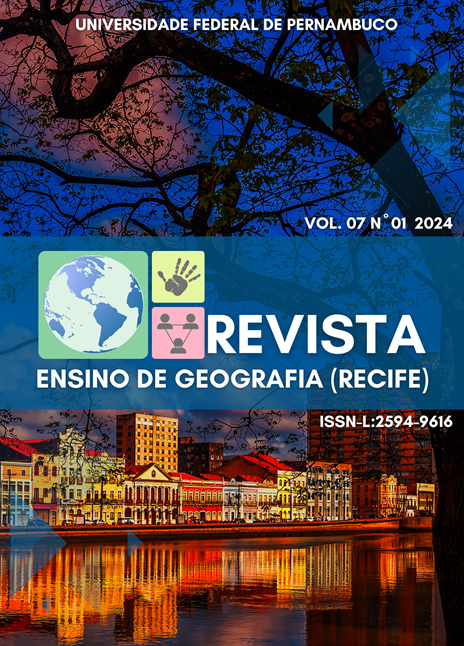Beyond the map: the intrinsic relationship between geographical education and child citizenship formation
DOI:
https://doi.org/10.51359/2594-9616.2024.261739Keywords:
Geography, education, educational practicesAbstract
This article aims to investigate how geographical education contributes to the development of citizenship formation in children in the first years of elementary education. By adopting this innovative perspective, we seek not only to fulfill educational guidelines but also to promote a more engaging and practical learning experience. In order to achieve the outlined objective, a qualitative research approach was chosen, employing bibliographic research as the procedure, aiming to contextualize our research within the current academic landscape. Significant contributions from renowned authors and relevant theoretical perspectives for the studied theme are used as a basis for theoretical foundation, such as Piaget (1947), who addresses child development, impacting the teaching-learning process. Callai (2002) discusses how the teaching of geography affects educational and social relationships. The findings of the research are discussed in "The Advent of Geographical Education in Elementary Education I" and "Advancements and Challenges of Geography Teaching in the Classroom," highlighting the impacts generated by geography teaching on students' citizenship formation.
References
BRASIL. Lei nº 9.394, de 20 de dezembro de 1996: Estabelece as diretrizes e bases da educação nacional. Ministério da Educação, 1996.
BRASIL. Ministério da Educação. Secretaria de Educação Média e Tecnológica. Parâmetros curriculares nacionais: Ensino médio, Brasília: MEC, 2000, 109 р.
BRASIL. Parâmetros Curriculares Nacionais: Terceiro e quarto ciclos do Ensino fundamental introdução aos parâmetros curriculares nacionais. Brasília: MEC, 1998, 174 р.
BRASIL. Parâmetros Curriculares Nacionais: Geografia, Brasília: MEC, 1995.
CALLAI, H. C. A formação do profissional da Geografia. Ijui: UNIJUÍ, 1999.
CAVALCANTI, L. de S., Geografia e práticas de ensino. Goiânia: Alternativa, 2002.
CAVALCANTI, L. de S. Geografia, Escola e Construção de Conhecimentos. Editora Papirus. São Paulo. 2010.
FREIRE, P. Pedagogia da autonomia: saberes necessários à prática educativa. São Paulo: Paz e Terra, 1997.
FREIRE, P. Pedagogia do Oprimido. Rio de Janeiro: Paz e Terra, 43° edição, 2005.
IMBERNÓN, F. Formação Docente e Profissional: Formar-se para a mudança e a incerteza. 3.ed. São Paulo, Cortez, 202 (Coleção Questões da Nossa Época: v. 7).
LIBANEO, J. C. Adeus professor, Adeus professora?: novas exigências educacionais e profissão docente. São Paulo: Cortez, 1998.
LÜDKE, M. O professor e a pesquisa. Campinas: Papirus, 2001. (Prática Pedagógica.)
OLIVEIRA, M. M. A geografia escolar: reflexões sobre o processo didático- pedagógico do ensino. Revista Discente Expressões Geográficas, Santa Catarina, v. 2, p. 10-24, 2006.
PRADO, C. J. B. do., SÔNIA M. M. C. O livro didático de geografia: estudo da linguagem cartográfica sob o foco da formação da consciência espacial cidadã. Educação em Revista 32 (2016): 365-389.
Downloads
Published
How to Cite
Issue
Section
License
Copyright (c) 2024 Iuri Davi Silva Araújo, Karen Fernanda Oliveira Silva , Delcivane Santos Silva

This work is licensed under a Creative Commons Attribution 4.0 International License.
Authors who publish with this journal agree to the following terms:- Authors retain copyright and grant the REVISTA ENSINO DE GEOGRAFIA (RECIFE) right of first publication with the work simultaneously licensed under a Creative Commons Attribution NonCommercial International 4.0 (CC BY-NC) that allows others to share the work with an acknowledgement of the work's authorship and initial publication in this journal.
- Authors are able to enter into separate, additional contractual arrangements for the non-exclusive distribution of the journal's published version of the work (e.g., post it to an institutional repository or publish it in a book), with an acknowledgement of its initial publication in this journal.
- Authors are permitted and encouraged to post their work online (e.g., in institutional repositories or on their website) prior to and during the submission process, as it can lead to productive exchanges, as well as earlier and greater citation of published work.



